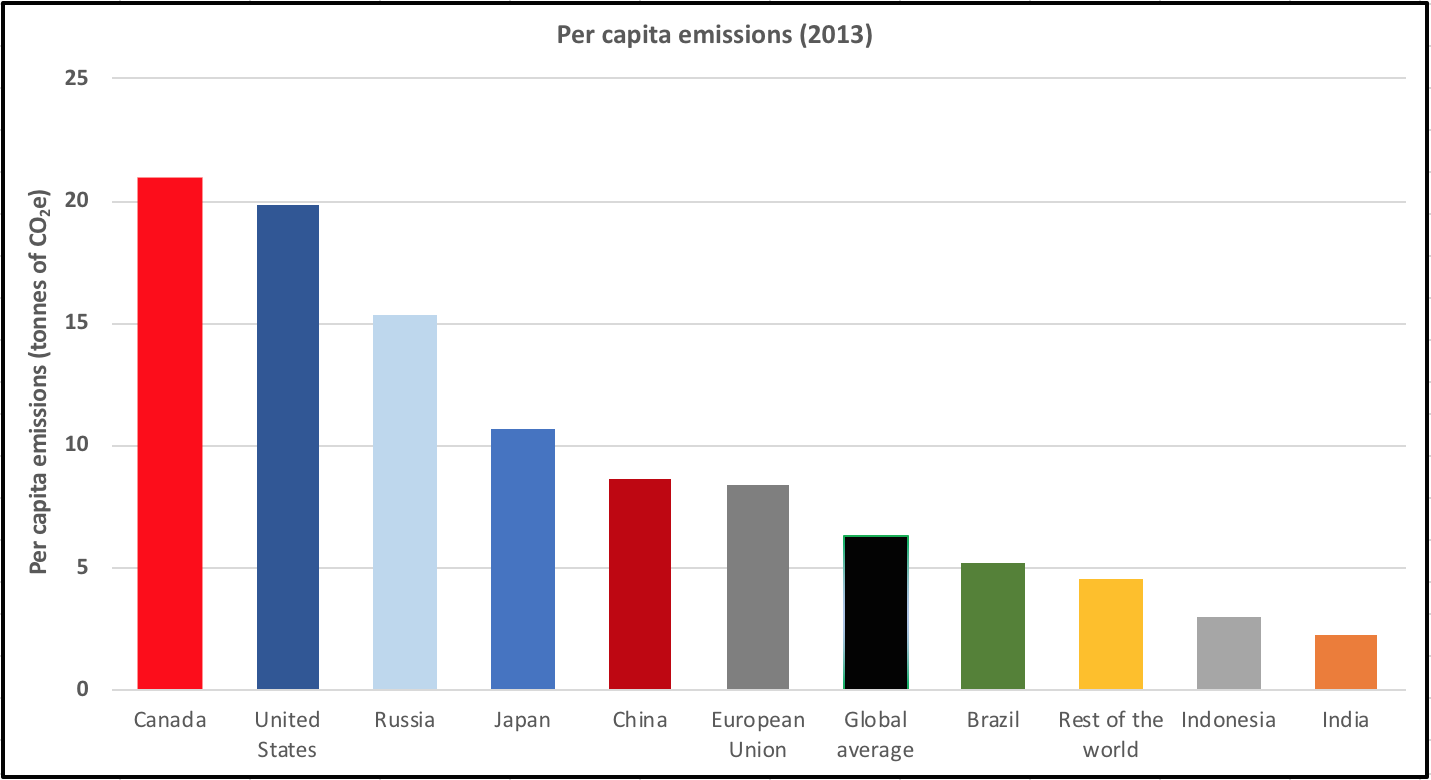
Why 1.6% matters
Canadians have strong moral and economic arguments for reducing our greenhouse gas emissions. But how could Canada’s seemingly minor share of global emissions (about 1.6%) possibly be of consequence? What do our actions matter? Quite a bit, actually, and we can slice the data in different ways to show why.
The big picture
Humanity collectively emits around 45,000 megatonnes of greenhouse gases (GHGs) a year. In 2016, Canada’s share was 704 megatonnes — the notorious 1.6%. That’s enough to make us a top-10 emitter.
Source: ECCC, 2017; World Resources Institute, 2017
We’re also the only country in the top 10 with a population under 100 million, and the highest per-capita emitter in the group. Canada, home to 0.5% of the world’s people, produces 1.6% of its emissions. We make an outsized contribution to the problem.
Source: ECCC, 2017; Population Reference Bureau, 2017
We can put this contribution into context using a few hypothetical scenarios: If every top-10 nation matched Canada’s per-capita emissions, global emissions would more than double. If every nation in the world matched Canada’s per-capita emissions, global emissions would more than triple. Conversely, the average Canadian would have to slash their carbon footprint by 60% to square up to the average European.
We emit more than our fair share. So what?
The moral arguments
If Canada doesn’t enact strong, sensible climate policy, why should non-top-10 emitters bother?
I’ve yet to hear anyone suggest that China’s 25% share of global GHG emissions isn’t an issue. More often, we hear them cited as the chief problem. If we can agree that China’s 25% is consequential, we should be able to agree that 30%—the contribution of all non-top-10 nations—matters, too.
If Canada balks at climate leadership claiming that 1.6% isn’t enough to matter, we’ll hand every smaller country a more potent version of the same argument. Some 180 nations could collectively reason that they aren’t the problem, either. Imagine our obstinacy, rather than our initiative, becoming an example to the world.
Not only is Canada a top-10 emitter, it has a top-10 economy, and it so happens that it’s underpinned by fossil fuels. Tackling our emissions doesn’t mean undoing our prosperity, but it does mean reconciling our economic fortunes with the side effects. Telling countries that didn’t have the benefit of abundant, cheap energy to reduce their emissions and adapt to the new climate normal, without pressing ahead with our own policies? That’s a tough sell, to say the least.
(David Moscrop has a few thoughts on this, too.)
The economic arguments
Economic arguments for acting on climate change fall into two camps.
First, we need to reduce the risks of catastrophic climate change. This means responsibly reducing our emissions, and bracing ourselves for the inevitable climatic shifts we’ve wrought so far. At least the ones we can foresee.
There’s not much we can do about the GHGs we’ve produced to date. But as Joel Wood has pointed out, every tonne of GHGs we mitigate from now on has benefits.
Instead of focusing on Canada’s negligible impact on global temperatures, we should consider the very real damages caused by every additional tonne we produce, and the very real benefits of every tonne we save. These incremental changes are more than mere symbolism; they will help reduce the intensity of more predictable extreme events like coastal flooding, droughts and increased disease transmission.
Conversely, if Canada doesn’t act meaningfully on climate change, it could face political and economic obstacles in the future. For example, countries that have already implemented carbon pricing could start using border carbon adjustments, forcing carbon costs onto Canadian exporters or slapping them with other punitive tariffs. This isn’t some theoretical exercise, either. Countries will start trying it.
Limiting these risks and uncertainties means implementing practical, common-sense, low-cost policies as soon as possible, and strengthening them over time. This logic holds for every country, including Canada.
Second, we want to capture as much of the financial upside as we can. Meaningful action on climate change could be a significant economic opportunity for those who can keep pace. Here, we can think selfishly as the global market for low-carbon innovation grows.
Two economic arguments, one glass-half-empty, another glass-half-full. Addressing both means getting a handle on our 1.6%, sharing what we learn, and selling what we make.
Adding it up
Think of your household budget or your business expenses. If you could trim at 1.6% of your costs, wouldn’t you? Pennies make dollars. Tonnes make megatonnes. There are plenty of arguments for Canada to ramp up our climate policy. And the notion that we’re doing this alone is simply false. Other top-10 emitters aren’t sitting idle.
Our lifestyles are energy-intensive; they don’t have to be emissions-intensive. The costs of us acting are real, but small. We can wean ourselves off now, gently, and embrace our chance to do more with less.
Acting on Canada’s 1.6% is an opportunity to improve our long-term economic prospects, and demonstrate that a low-carbon economy is doable and desirable. The world has a lot of heavy lifting ahead. Canada—one of the world’s premier emitters—should flex its muscles.






4 comments
How can you in all consciousness actually use per capita production as a justification. It’s mathematically irrelevant to the issue.
Hi Barry,
Per-capita figures are a good way to look at each country’s contribution relative to their population. It also allows us to compare ourselves to nations that are similarly are wealthy, cold, and with dispersed populations (parts of the U.S., Sweden, Norway, Finland, Iceland). No matter how you look at it, Canada performs poorly. It’s not our fault that we live in a cold country and produce a lot of emissions, but it’s still our responsibility.
Thank you, Brendan, for an extremely effective article.
I think per capita emissions are extremely relevant. Indeed, it’s the only fair way of assessing the problem. National comparisons are meaningless due to vastly different populations in each country. The fact is that there is a global carbon budget, within which each person on the planet (not each country) can be allocated her or his fair share proportionally. In this respect, each Canadian is on average far, far exceeding our fair share of global emissions.
Comments are closed.